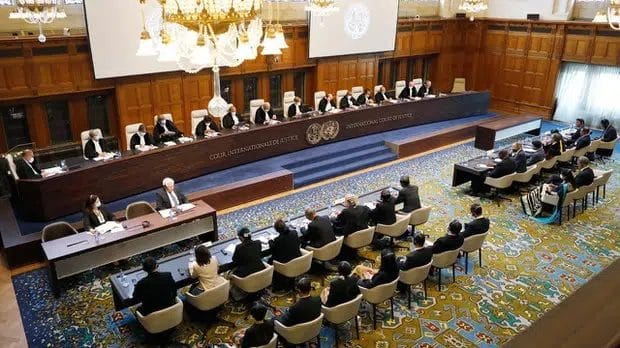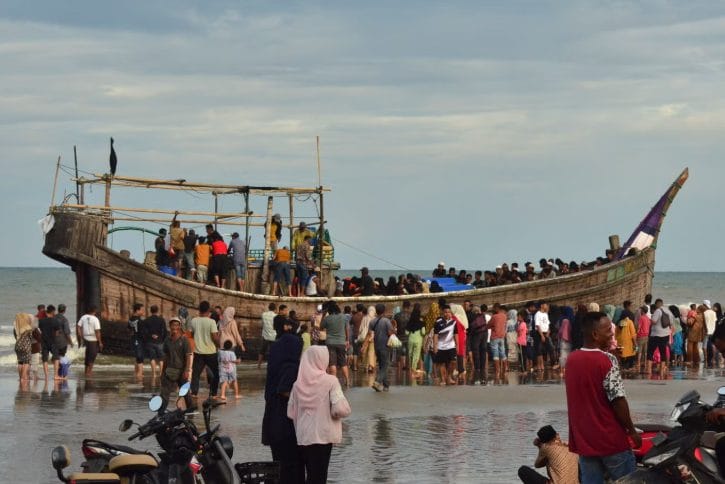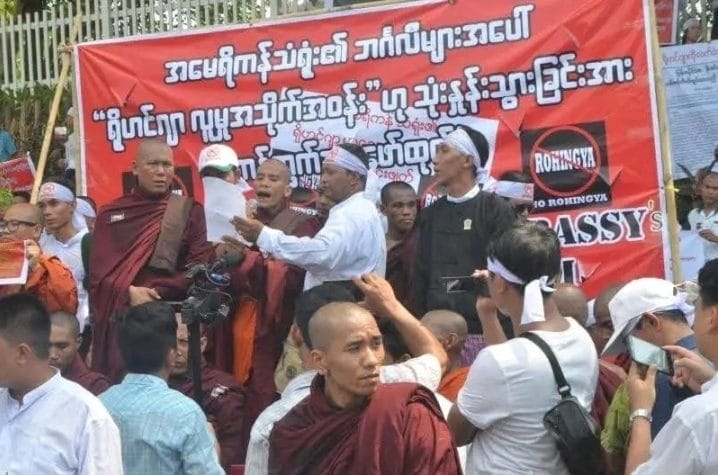Arakan News Agency
The Arakan Rohingya National Council (ARNC) has condemned a recent report by the International Crisis Group (ICG) that alleged the presence of armed activity in Rohingya refugee camps, saying the report provided no concrete evidence and ignored the plight of the Rohingya people, while encouraging further abuses against them.
The ARNC said the June report presented a “flawed and fabricated narrative” about the Rohingya, while legitimizing the violations committed by the Arakan Army, a separatist group currently controlling parts of Arakan State in western Myanmar. It criticized the report’s focus on alleged “military recruitment” and “risks of insurgency,” which it said diverted attention from the root causes of the Rohingya crisis.
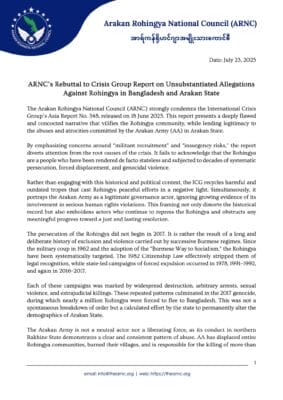
The statement added that the report failed to acknowledge that the Rohingya have become de facto stateless, subjected to systematic persecution, forced displacement, and violence aimed at their destruction. It said the report ignored the political and historical context and recycled accusations that undermine Rohingya efforts for peace, while also disregarding the continued impunity and violations against them.
The ARNC refuted the report’s claims about potential armed confrontation between Rohingya factions and the Arakan Army, calling them exaggerated and unfounded. It emphasized that the majority of Rohingya oppose violence and seek voluntary and peaceful repatriation to their homeland, and warned against attempts to portray them as radical or religious extremists.
The statement also criticized the report for claiming the absence of civil leadership among the Rohingya, ignoring the fact that community leaders have either been deliberately marginalized or assassinated due to the failure of the international community and the UN to protect them. It asserted that Rohingya civil leadership remains active and committed to peaceful solutions but is sidelined in diplomatic processes.
The ARNC denounced the report’s attempt to legitimize the Arakan Army by presenting it as a governing authority that should be diplomatically engaged, downplaying its abuses against the Rohingya. It warned that portraying the group as a potential inclusive authority ignores firsthand testimonies of ethnic exclusion, racial crimes, and the worsening conditions for Rohingya under its control conditions worse than those under the Myanmar military.
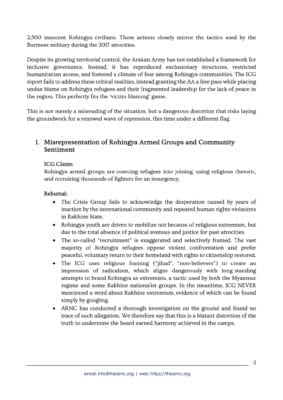
The statement said the report failed to address these realities and essentially gave the Arakan Army a free pass while blaming Rohingya refugees and their fragmented leadership for the lack of peace in the region. This amounts to a “blame-the-victim game,” the council said, describing it not merely as a misunderstanding, but a dangerous distortion that could lay the groundwork for renewed violence under a new pretext.
Despite its growing territorial control, the statement added, the Arakan Army has not worked toward an inclusive governance framework. Instead, it has recreated exclusionary systems that block humanitarian aid and spread fear among the Rohingya, committing serious violations including killings and village burnings.
The ARNC also rejected the report’s claim that Bangladesh supports armed groups, calling it harmful to ongoing diplomatic efforts. It stressed that Bangladesh bears the brunt of the crisis by hosting over one million Rohingya refugees. Rather than casting blame, the statement urged the focus be shifted to the international community’s failure to hold Myanmar and the Arakan Army accountable or support a political resolution to the crisis.
The council affirmed that the persecution of the Rohingya did not begin in 2017, when Myanmar’s military launched a genocidal campaign, but is rooted in decades of systematic expulsion and violence carried out by successive regimes. This includes denial of citizenship, forced detention, sexual violence, and extrajudicial killings.
Bangladesh has also publicly rejected the ICG report, which is based in Brussels, describing its content as baseless and unfounded.
Nearly one million Rohingya have fled to Bangladesh since Myanmar’s military launched its brutal crackdown in 2017. Waves of displacement have since resumed following the resurgence of fighting between the Myanmar military and the Arakan Army, which launched an offensive to seize control of Arakan State in November 2023 and has since captured large swaths of the region.


